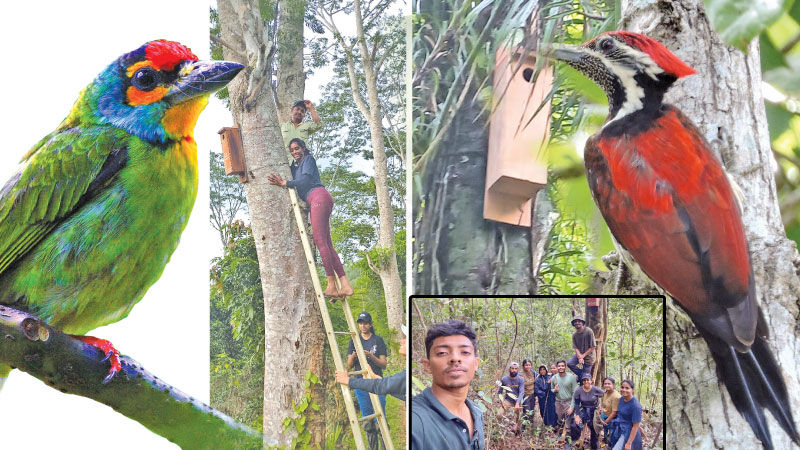Rejuvenating wetlands for biodiversity and sustainability
- Plant Administration
- Nov 30, 2024
- 3 min read

The Wildlife and Nature Protection Society’s (WNPS) PLANT initiative recently joined forces with Interact District 3220, a youth-led movement in Sri Lanka and the Maldives, to launch “GreenCon’24” with an ecosystem restoration project at Frocester Estate in Govinna. In the second week November, nearly 100 Interactors from over 20 schools across Sri Lanka trekked uphill to participate in this effort to rejuvenate a vulnerable wet-zone habitat.
The Frocester Estate, managed by Horana Plantations under the Hayleys Group, is a critical site for ecological restoration under WNPS PLANT, which focuses on improving habitat connectivity across Sri Lanka’s endemic-rich southwestern quadrant. Previous successes by PLANT at Maskeli Oya and Halwatura regions laid the groundwork for this collaboration. Restoration at Frocester Estate, formally launched with support from Interact District 3220, integrates education and practical conservation efforts.
Guided by Rotary International’s motto, “Service Above Self,” Interact District 3220 embodies youth-driven change. GreenCon’24 united students from Kandy, Gampaha, Colombo, and Galle to address critical environmental challenges. Participants engaged in tree planting, learned about ecosystem connectivity, and explored the region’s biodiversity under the guidance of PLANT teams.
“Each sapling symbolises a promise to protect the environment for future generations,” said Int. P.P. Kavishkaa Premanand, Chairperson of GreenCon’24. Beyond planting, the initiative encouraged dialogues about tackling invasive species and enhancing biodiversity conservation.
Frocester Estate
Nestled near the Kalu Ganga River Basin, the Frocester Estate is home to rich biodiversity but has suffered habitat degradation from invasive species and agricultural expansion.

With 40 hectares under natural regeneration, the estate is a critical conservation site within Sri Lanka’s wet zone, where 90 percent of the country’s endemic species are found.
On the day of the event, participants planted 500 native trees, including Diya Na (Mesua thwaitesii), Dawul Kurundu (Neolitsea cassia), and Hora (Dipterocarpus zeylanicus), which provide essential habitats and contribute to ecosystem health.
Restoration projects like this extend beyond environmental impact; they serve as outdoor classrooms for practical environmental education.
Students learned about the vital role of native trees in supporting biodiversity, explored a nearby stream to understand aquatic ecosystems, and experienced firsthand the complexities of restoration work. PLANT’s emphasis on scientifically driven restoration empowers communities and youth to contribute meaningfully to conservation efforts.
“Being in the field and contributing to a greener future was an unforgettable experience—a reminder of how deeply connected we are to the world around us, ” PHF Int. PP. Damian De Cruz, District Interact Representative said.
Sri Lanka’s wet zone faces significant threats from human activity. Restoration efforts like those at Frocester Estate aim to counteract these threats by reintroducing native vegetation to suppress invasive species, stabilise soil, and improve water quality. These initiatives also restore wildlife corridors, reducing human-wildlife conflicts while fostering ecological connectivity.
WNPS PLANT, Sri Lanka’s largest private ecosystem restoration initiative, protects over 2,500 acres, creates new forests across 360 acres, and conserves over 1,000 species. With over 30 partners, PLANT manages more than 50 kilometres of forest corridors and continues to integrate education with conservation.
A greener future
The convention for GreenCon’24 participants, held at St. Joseph’s College, Colombo, featured a session where PLANT shared its broader conservation journey, including the Emerald Trail initiative.
Looking ahead, the PLANT team, along with local communities, aims to plant over 5,000 trees at Frocester Estate, creating a thriving biodiverse forest. Continued support from partners like Traffisafe Limited ensures the project’s sustainability.
WNPS PLANT invites individuals, organisations, and corporates to join its journey of ecosystem restoration. Whether through financial support, volunteering, or spreading awareness, everyone can contribute to this collective effort to restore Sri Lanka’s natural heritage and become part of “Generation Restoration.”
This article first appeared in The Sunday Observer on the 1st of December 2024.






Comments